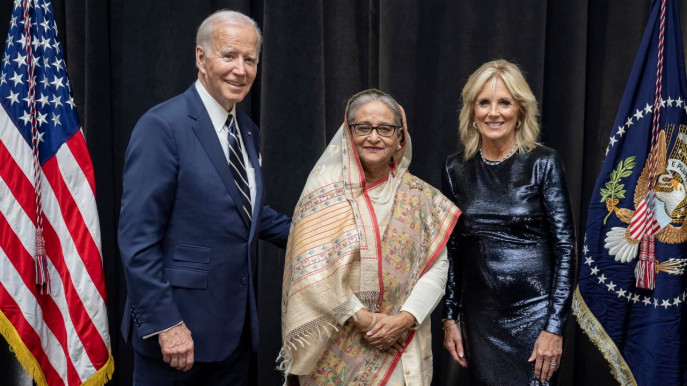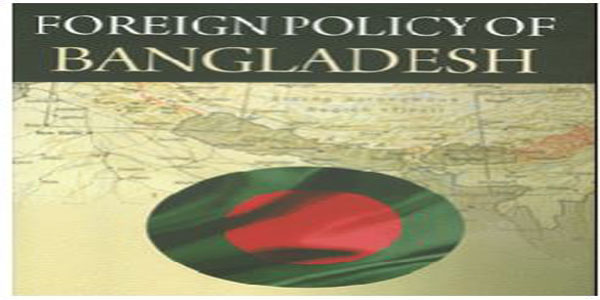Prime Minister Sheikh Hasina's insistence in recent times that the sanctions imposed by the West on Russia in light of Moscow's military assault on Ukraine be lifted is a powerful hint of Bangladesh's assertive diplomacy under her leadership. There is little question that the Bangladesh leader, who has been in office longer than any of her predecessors, remains the fulcrum around which the country's politics, inclusive of its foreign policy, revolves.
Not many have been among the community of global political figures who have called for a rolling back of sanctions on Russia. Sheikh Hasina's call, elaborated as it was by her recent policy statement at the United Nations General Assembly proposing an end to the weapons business currently dominating the globe, was governed by the national interest. Nations like Bangladesh, always at the receiving end of the ramifications of large-scale global conflict, today feel they need to speak up. That Sheikh Hasina has spoken up on the sanctions issue is indicative of the confidence which characterises her approach to international relations.
Of course, Bangladesh's growing economy, despite the travails brought on by the coronavirus crisis, has been a factor in its foreign policy acquiring the substance needed for a strengthening of the country's approach to the outside world. Add to that the fact that Sheikh Hasina's leadership --- both in her party and at the national level --- has been instrumental in a projection of Bangladesh's position vis-à-vis its national interests abroad. In these many years and especially since January 2009, when the Awami League returned to power, diplomacy has been a major plank of government policy on Sheikh Hasina's watch.
Any reflection on the country's diplomacy will necessarily take into account Bangladesh's relations with India. Dhaka has deftly been working on a strengthening of ties with Delhi and that despite the feelings generated by the rise to power of the Bharatiya Janata Party in India in 2014 that ties between the two nations would sooner or later run into difficulties. Precisely the reverse has happened, with the BJP and Awami League governments consistently deepening cooperation in trade, anti-terrorism measures and through a common approach to regional issues.
To be sure, Teesta yet remains an intractable issue, but the efforts of the Bangladesh government to convince the West Bengal administration of Mamata Banerjee of the need for a just and equitable resolution of the problem have gone on. Sheikh Hasina clearly enjoys good rapport with Banerjee, which again is a sign of the diplomacy governing her approach to issues beyond Bangladesh's frontiers.
On the Rohingya issue, Sheikh Hasina's government has been careful about maintaining a diplomatically correct stance. On the one hand --- and it is a position she reiterated at the UNGA last week --- the Prime Minister renewed her call for Myanmar to take back its million-plus Rohingyas back to their homes in Rakhine state. On the other hand, despite the recent provocations by the Myanmar military along the border with Bangladesh, Dhaka has adopted a pragmatic approach to its links with Naypyitaw. Maturity rather than belligerence has been at work in Bangladesh's ties with Myanmar on the Rohingya issue.
Certainly a major indication of Bangladesh's foreign policy under Sheikh Hasina has been the clarity of vision the government has demonstrated in its overview of global realities. With Russia, economic cooperation in several sectors --- and Rooppur is an instance --- has been well pronounced in these thirteen years since 2009. Sheikh Hasina has exercised much needed wisdom in staying away from falling in line with the West in a blanket condemnation of President Vladimir Putin's policy in Ukraine.
Such assertiveness has been at work in Dhaka's ties with Beijing as well. Bangladesh's leader and Chinese President Xi Jinping have met on a number of occasions. Besides, other senior figures --- the visit of the Chinese Foreign Minister to Bangladesh a few weeks ago is to be cited --- have been in touch over a wide range of issues where the two nations can cooperate to their mutual benefit.
In simple terms, Bangladesh's relations with the three major powers of the region --- India, China and Russia --- have consistently evolved under Sheikh Hasina, to a point where Dhaka's diplomacy has been maintained on an even keel. One of course will not deny the subtle pressures that are usually applied in such relations, but that the Bangladesh government has adroitly negotiated its way into achieving a balance in diplomacy regarding this significant regional triumvirate testifies to its enhanced confidence in articulating its views before the world.
With the United States, despite the sanctions recently imposed on some senior security officials of Bangladesh by Washington, relations in the political and economic arenas have withstood the test of time. In Europe, the focus has remained on economics, with Dhaka stressing the need for an expansion of its export market and not just in the readymade garments sector. Following initial hiccups with Turkey over Ankara's criticism of the war crimes trials in Dhaka, diplomatic ties have returned to normality.
Bangladesh's ties with Pakistan under the Awami League government remain stalled, in that broad manner of speaking. But the exchange of letters between then Pakistani Prime Minister Imran Khan and Sheikh Hasina was reflective of a cordiality rarely displayed in the decades since Bangladesh's successful War of Liberation in 1971. In the Middle East, Dhaka enjoys the confidence of policy makers in the countries of the region.
Sheikh Hasina has been a powerful voice in articulating Bangladesh's concerns over climate change. The government has played a foremost role, one not unnoticed by the global community, in calling upon governments elsewhere to be more proactive in tackling the crisis. With climate change posing a threat to Bangladesh's coastal regions in the future, such a position on the part of the government has been natural.
On Prime Minister Sheikh Hasina's watch, Bangladesh's foreign policy has evolved into the degree of maturity demanded by global diplomacy. The good point here is that the nation's dealings with the outside world hold the promise of gaining greater depth and substance in the times ahead. Its commitment to regional and international organisations has never wavered.
In the party
At home, Sheikh Hasina's leadership of the Awami League has been remarkable in that she has served longer than any other politician in conducting the affairs of the party. Unchallenged in the party, she has been its face before the country in the way Bangabandhu Sheikh Mujibur Rahman was in the 1960s and well into the mid-1970s.
Sheikh Hasina's return home from exile in May 1981 was the beginning of a process of transformation of the Awami League, riven as it was at the time by factionalism. With the assassination of Bangabandhu, followed by the murder of the four national leaders in prison, the party slumped into an unprecedented crisis. It did not help that as many as three factions led by political figures with less than national appeal only worsened the situation.
Besides, in an era of brutal military dictatorship, which was instrumental in luring away politicians from the political parties to the new outfit it would form as a way of legitimising its hold on power, the Awami League saw a fairly good number of its leading figures desert the organisation.
It was opportunism at its most sinister. The party at that point was in sore need of a leader able to reunify it around the principles on which it had been founded and around the policies that had led it into providing leadership to the struggle for autonomy and eventually national independence.
Sheikh Hasina's assumption of the leadership of the Awami League, even though she was yet to return home, was more than a revival of the old party. Indeed, it was a reinvention of it. Since May 1981, therefore, Sheikh Hasina has stamped her authority on the party in a comprehensive way. Through thick and thin --- and include here the many attempts made to wipe out the party leadership by erstwhile state actors and religious fundamentalists --- the Awami League has successfully emerged as the natural party of government in Bangladesh.
And yet Sheikh Hasina needs to do more in the party and for it, by taking a leaf out of Bangabandhu's book. The Father of the Nation, in his time, prepared a second tier of leadership in the party, one that could wield authority in his absence. In Syed Nazrul Islam, Tajuddin Ahmad, M. Mansur Ali and A.H.M. Quamruzzaman, Bangabandhu had a leadership ready to deal with circumstances that might and did arise after and beyond him.
The War of Liberation remains proof of Bangabandhu's sagacity in this respect. Each of the four leaders of the Mujibnagar government demonstrated wisdom and astuteness expected of political beings.
It ought to be for Sheikh Hasina to have in place a group of politicians in the Awami League who will not only be able to send the party chief's message out to the country but also convince the nation that the Awami League is a political organisation ready to provide leadership to the country as and when such leadership is called for, now and in the future.
As Sheikh Hasina's 75th birthday is being observed by the nation, it is her legacy, the strength of determined leadership she has symbolised, the idealism which has governed her political philosophy which are being focused on. For obvious reasons, of course.
(Syed Badrul Ahsan, a political and diplomacy analyst, has authored biographies of Bangabandhu Sheikh Mujibur Rahman and Tajuddin Ahmad. He is currently at work on a comparative study of the politics of Deshbandhu Chittaranjan Das, Netaji Subhas Chandra Bose and Bangabandhu Sheikh Mujibur Rahman)















